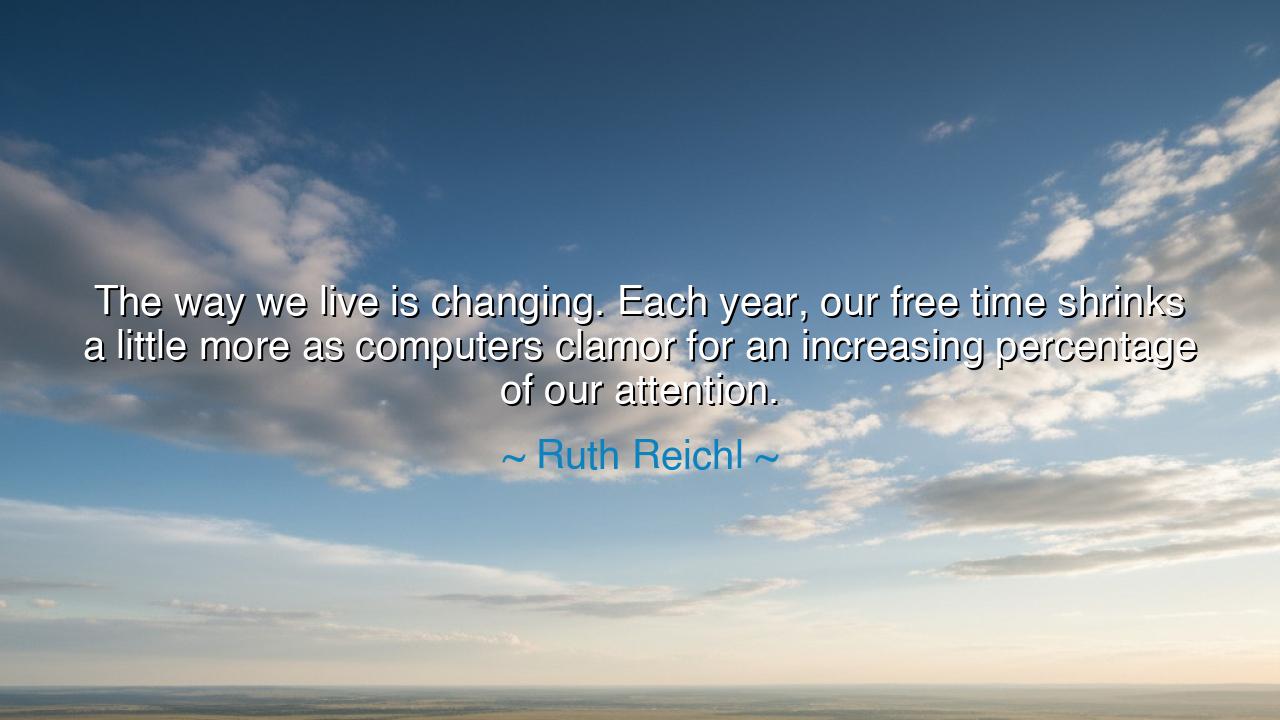
The way we live is changing. Each year, our free time shrinks a
The way we live is changing. Each year, our free time shrinks a little more as computers clamor for an increasing percentage of our attention.






“The way we live is changing. Each year, our free time shrinks a little more as computers clamor for an increasing percentage of our attention.” — Ruth Reichl
Listen, my children, to the words of Ruth Reichl, a voice from the bridge between the old world and the new. Her lament is not merely about machines, but about the theft of time, the silent erosion of the soul’s stillness. She speaks of an age when computers clamor—when the tools that once promised freedom have begun to command obedience. In her observation lies a quiet warning: that humanity, in seeking to master technology, has allowed itself to become the servant.
Once, the hours of the day were marked by the rising of the sun and the setting of the moon. Men and women worked with their hands, rested with their kin, and found joy in the rhythm of the seasons. But now the way we live is changing—our days fractured into notifications, our nights invaded by glowing screens. What began as a miracle of communication has become a constant cry for our attention. The machine does not sleep, and so neither do we. And each passing year, our free time shrinks, not by decree, but by surrender.
There was a time, not long ago, when the hum of a computer was a rare and wondrous sound. In the early dawn of the digital age, it was hailed as a servant of progress, a faithful scribe for human knowledge. Yet, as Reichl saw, the servant became a seducer. The computer, with its ceaseless pings and flashing lights, began to whisper promises—connection, entertainment, information, control. But every whisper came with a price. Bit by bit, we traded silence for stimulation, reflection for reaction, and presence for distraction.
Consider the tale of Narcissus, the youth of ancient myth, who gazed into the pool and fell in love with his own reflection. He could not pull himself away, for he believed he was gazing into life itself. But what he saw was only the echo of his image—a mirage that drowned his spirit. So too does the modern soul bend over its glowing screen, entranced by reflections of others, fragments of news, illusions of meaning. The pool has changed form, but the peril remains the same: we risk losing our very selves in pursuit of endless connection.
Yet, Reichl’s words are not without hope. To say that “the way we live is changing” is not to say it is doomed. Change can also be rebirth. She invites us to awaken—to see the cost of our attention and reclaim it. For attention is life itself. Wherever we direct it, there our spirit dwells. If we offer it wholly to the machines, our souls grow hollow; but if we reclaim it, if we turn it toward the living—toward family, creation, beauty, and silence—we rediscover our humanity.
Let us, therefore, learn again the art of stillness. Let there be hours unmeasured by the clock and untouched by the screen. Walk without your devices. Speak face to face. Write with your hands. Sit quietly and hear the wind. Guard your attention as a sacred flame, for it is the essence of freedom. Every moment we reclaim from the machines is a moment returned to our true lives.
And so, my friends, take this wisdom as both a warning and a call to courage. The world will continue to clamor; the machines will never tire. But you are not their servant—you are their master. Choose when to listen, and when to be silent. For as Reichl foresaw, the fate of our spirit depends not on how much we connect, but on how deeply we remain human amidst the noise. In that choice lies the true victory of our age—the victory of the soul over the screen.






AAdministratorAdministrator
Welcome, honored guests. Please leave a comment, we will respond soon